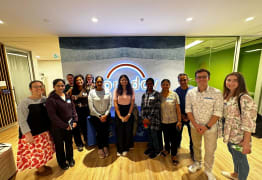Learning New Skills for the Future of the Workplace

The world of work is changing rapidly. With the rise of new technologies and a constantly evolving job market, it’s more important than ever to stay relevant and competitive in your industry. Here’s how you can do that through reskilling and upskilling, plus an exploration of the most in-demand skills for the future of the workplace and some helpful tips for building skills.
Upskilling and Reskilling
As the workplace evolves, learning new skills that will set you up for success in the future is incredibly important. Though it can be challenging to tackle new skills, systems, and strategies, it’s an essential way to improve your economic mobility and help you secure steady and fulfilling work. Upskilling and reskilling are two key strategies for this.
Upskilling involves learning new skills that build upon your existing knowledge and expertise. It’s a way to enhance your current skill set and stay up-to-date with the latest industry trends and best practices. Reskilling, on the other hand, involves learning entirely new skills that may be outside of your current area of expertise. This is often necessary when your current skill set is no longer in demand or when you want to transition to a new career path.
Both upskilling and reskilling have numerous benefits for your working future. They can help you stay competitive in the job market, increase your earning potential, and open up new career opportunities. Learning new skills can also help you in other ways, by boosting your confidence, improving your problem-solving abilities, and enhancing your overall job satisfaction.
Best Skills To Learn for the Future
So, what are the best skills to learn for the future of business and the workplace? Here are a few in-demand skills to focus on:
- Digital literacy: With the increasing use of technology in the workplace, it’s important to have a basic understanding of digital tools and platforms. This includes proficiency in programs such as Microsoft Office, as well as knowledge of cloud computing, data analysis, and cybersecurity.
- Behavioural skills and mindsets: Also known as soft skills, these personal attributes enable you to skillfully and effectively interact with others. Communication, teamwork, leadership, and problem-solving abilities are all essential skills. With automation on the rise, these skills will become even more valuable in human roles.
- Creativity and innovation: As machines become more proficient at routine tasks, human creativity and innovation will become more important. Developing your creativity and ability to think outside the box can help you stand out in your field and find new solutions to problems.
- Emotional intelligence: Emotional intelligence is the ability to recognize and manage your own emotions, as well as those of others. It’s a crucial skill for promoting harmonious and collaborative work environments as teams become more diverse and inclusive.
- Industry-specific skills: Depending on your industry, there may be specific skills that are in high demand. In healthcare, for example, knowledge of telemedicine and remote patient monitoring can be especially valuable for your future prospects.
Skill Building
Now that we’ve explored skills for the future, let’s look at how to learn new skills. Employ these skill-building activities and strategies to help improve your economic mobility and future outcomes:
- Take courses: Online courses and certification programs are a great way to learn new skills at your own pace. Many universities, trade schools, and professional organisations offer courses and certifications in a wide range of subjects. Here at Generation, our free employment programs are designed to support you on your journey to a satisfying professional career.
- Attend workshops and conferences: These events can provide an immersive learning experience and the opportunity to network with others in your field. Many organisations offer training events throughout the year.
- Read books and articles: Reading books and articles related to your field can help you stay up-to-date with the latest trends and best practices. This can be especially useful for building soft skills and staying informed about industry-specific topics.
- Seek out mentorship: Finding a mentor who has expertise in the skills you want to learn can be invaluable. They can provide guidance and advice as you work to develop your skills and navigate your career.
- Practise, practise, practise: Learning a new skill takes time and practice. Look for opportunities to apply your new skills in your current job, or consider taking on a side project or volunteer work to build your experience.
If you’re ready to level up your skill set for the future, Generation is here to help! Our free employment programs offer hands-on education and experience in a variety of fields, and are held online and offline in 17 countries worldwide.
At Generation, our mission is to train, support, and place people into otherwise inaccessible career opportunities that can change their lives. Explore our employment programs to see how we can help you, or donate today to help us create thriving career opportunities for our learners!







